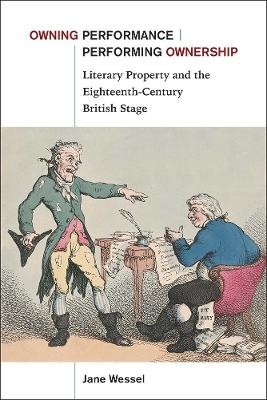
Owning Performance | Performing Ownership
Literary Property and the Eighteenth-Century British Stage
Seiten
2022
The University of Michigan Press (Verlag)
978-0-472-13307-9 (ISBN)
The University of Michigan Press (Verlag)
978-0-472-13307-9 (ISBN)
Follows the careers of the 18th century’s most influential playwrights, actors, and theatre managers as they vied for control over popular shows. Jane Wessel explores how playwrights and actors developed strategies for owning their works and how, in turn, theatre managers appropriated these strategies, putting pressure on artists to innovate.
In 1710, England’s first copyright law gave authors the ability to own their works, but it was not until 1833 that literary property law was extended to protect dramatic performance. Between these dates, generations of playwrights grappled for control over their intellectual property in a cultural and legal environment that treated print differently from performance. As ownership became a central concern for many, actors fought to possess their dramatic parts exclusively, playwrights struggled to control and profit from repeat performances of their works, and managers tried to gain a monopoly over the performance of profitable plays.
Owning Performance follows the careers of some of the 18th century’s most influential playwrights, actors, and theater managers as they vied for control over the period’s most popular shows. Without protection for dramatic literary property, these figures developed creative extra-legal strategies for controlling the performance of drama—quite literally performing their ownership. Their various strategies resulted in a culture of ephemerality, with many of the period’s most popular works existing only in performance and manuscript copies. Author Jane Wessel explores how playwrights and actors developed strategies for owning their works and how, in turn, theater managers appropriated these strategies, putting constant pressure on artists to innovate. Owning Performance reveals the wide-reaching effects of property law on theatrical culture, tracing a turn away from print that affected the circulation, preservation, and legacy of 18th century drama.
In 1710, England’s first copyright law gave authors the ability to own their works, but it was not until 1833 that literary property law was extended to protect dramatic performance. Between these dates, generations of playwrights grappled for control over their intellectual property in a cultural and legal environment that treated print differently from performance. As ownership became a central concern for many, actors fought to possess their dramatic parts exclusively, playwrights struggled to control and profit from repeat performances of their works, and managers tried to gain a monopoly over the performance of profitable plays.
Owning Performance follows the careers of some of the 18th century’s most influential playwrights, actors, and theater managers as they vied for control over the period’s most popular shows. Without protection for dramatic literary property, these figures developed creative extra-legal strategies for controlling the performance of drama—quite literally performing their ownership. Their various strategies resulted in a culture of ephemerality, with many of the period’s most popular works existing only in performance and manuscript copies. Author Jane Wessel explores how playwrights and actors developed strategies for owning their works and how, in turn, theater managers appropriated these strategies, putting constant pressure on artists to innovate. Owning Performance reveals the wide-reaching effects of property law on theatrical culture, tracing a turn away from print that affected the circulation, preservation, and legacy of 18th century drama.
Jane Wessel is Assistant Professor of English at the US Naval Academy.
Contents
Introduction
Chapter One
Charles Macklin and the Turn Away from Print
Chapter Two
Samuel Foote’s Strategic Ephemerality
Chapter Three
Managerial Interventions: George Colman, Thomas Harris, R.B. Sheridan, and the Practice of Buying Copyrights
Chapter Four
Tate Wilkinson’s Re-Performances: Performance as Piracy and Preservation
Chapter Five
Printing and Performing Drama in the Final Quarter of the Century: Elizabeth Inchbald and John O’Keeffe
Epilogue
Performing Ownership before Parliament: Literary Property and the “Decline of Drama”
Notes
Bibliography
Index
| Erscheinungsdatum | 13.06.2022 |
|---|---|
| Verlagsort | Ann Arbor |
| Sprache | englisch |
| Maße | 152 x 231 mm |
| Gewicht | 151 g |
| Themenwelt | Kunst / Musik / Theater ► Theater / Ballett |
| Geschichte ► Teilgebiete der Geschichte ► Militärgeschichte | |
| Geisteswissenschaften ► Sprach- / Literaturwissenschaft ► Anglistik / Amerikanistik | |
| Geisteswissenschaften ► Sprach- / Literaturwissenschaft ► Literaturwissenschaft | |
| Recht / Steuern ► Rechtsgeschichte | |
| ISBN-10 | 0-472-13307-1 / 0472133071 |
| ISBN-13 | 978-0-472-13307-9 / 9780472133079 |
| Zustand | Neuware |
| Haben Sie eine Frage zum Produkt? |
Mehr entdecken
aus dem Bereich
aus dem Bereich
neueste Manipulationstechniken als Waffengattung der NATO
Buch | Softcover (2023)
Westend (Verlag)
CHF 33,55
Deutschlands Schwäche in der Zeitenwende
Buch | Softcover (2023)
C.H.Beck (Verlag)
CHF 25,20


